climate
Top science body warns of worst coral bleaching event in history
The top scientific body that monitors the world’s tropical coral reefs, the US National Oceanic and Atmospheric Administration (NOAA), has warned that “We are literally sitting on the cusp of the worst bleaching event in the history of the planet.” Dr Derek Manzello, Coordinator of NOAA’s Coral Watch Program, told Reuters that “It’s looking like Continue reading »
The Danish City Reimagining Reuse
Every morning, about 50 to 100 people gather in line in front of a center owned by the municipality of Aarhus, the second-largest city in Denmark. Here, they can give — and take — all sorts of materials for free. More than two metric tons of objects pass through the center per day, from sofas to dishes, lamps to wardrobes, electronic devices to tables, all of which can be brought to new homes via cargo bikes the city lends to citizens.
The project started in 2015 when Kredsløb, a company owned by the city, noticed how much the citizens of Aarhus were throwing away. To solve this problem, they created a center called Reuse, explains Peter Christensen, its coordinator: a reimagined recycling station where goods can be taken for free.
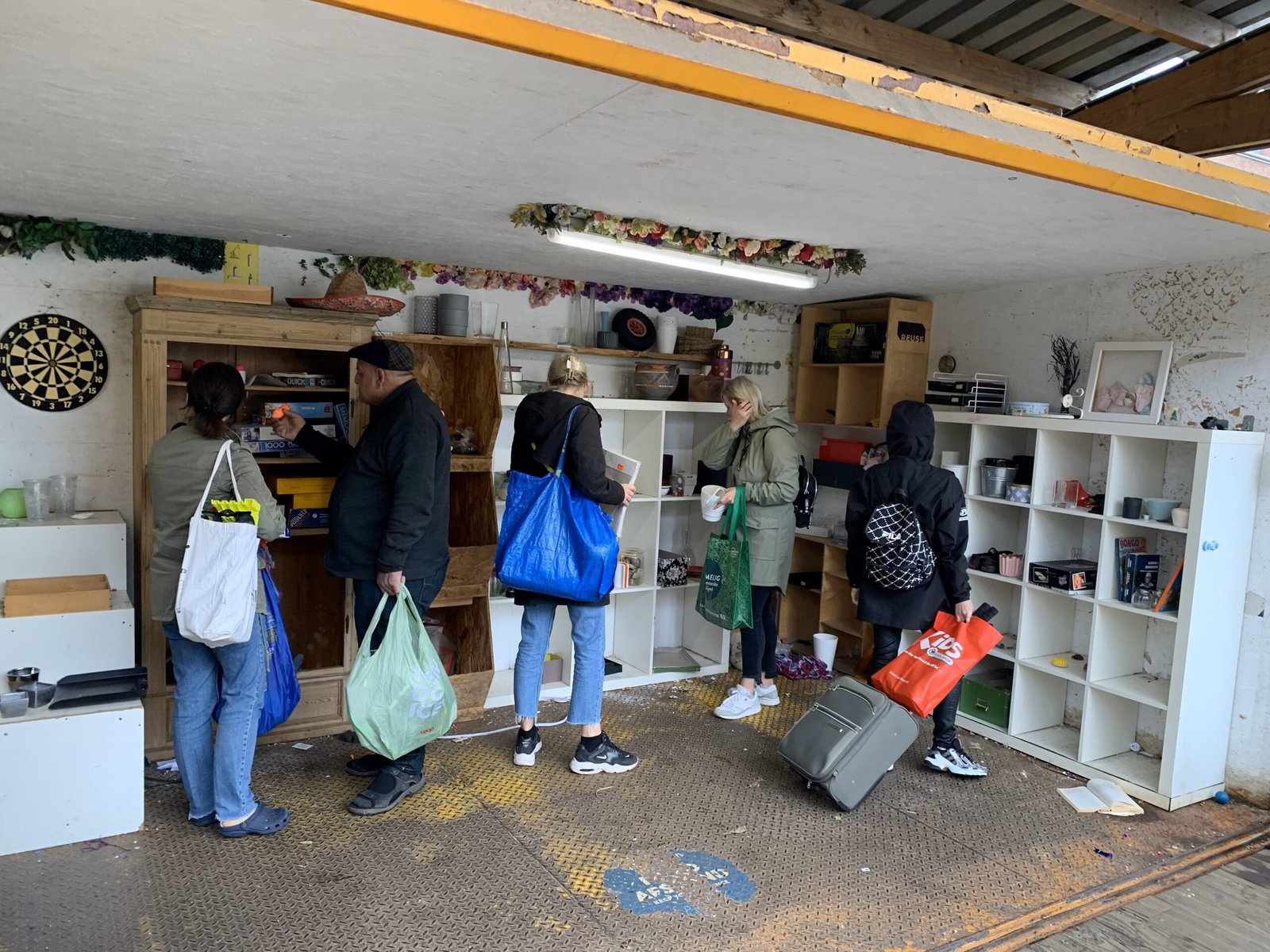 Citizens of Aarhus look for kitchenware at the circular economy center Reuse. Credit: Yael Berman
Citizens of Aarhus look for kitchenware at the circular economy center Reuse. Credit: Yael Berman
Denmark is known for its green policies and efforts to create a circular economy, in which “nothing becomes waste and the intrinsic value of products and materials are retained,” as defined by the Ellen MacArthur Foundation. It was ranked first in the 2022 Environmental Performance Index, and cities in the country are working on plans to become climate neutral. As part of one such plan, Aarhus has developed a waste strategy that will ultimately include seven material exchange centers placed inside recycling stations across the city, of which Reuse is the first.
“You take something that wasn’t worth anything and add value to it just by picking it up. This idea is maybe the key or the cornerstone of what Reuse is to me,” explains Lasse Andersen, a Reuse regular of about four years.
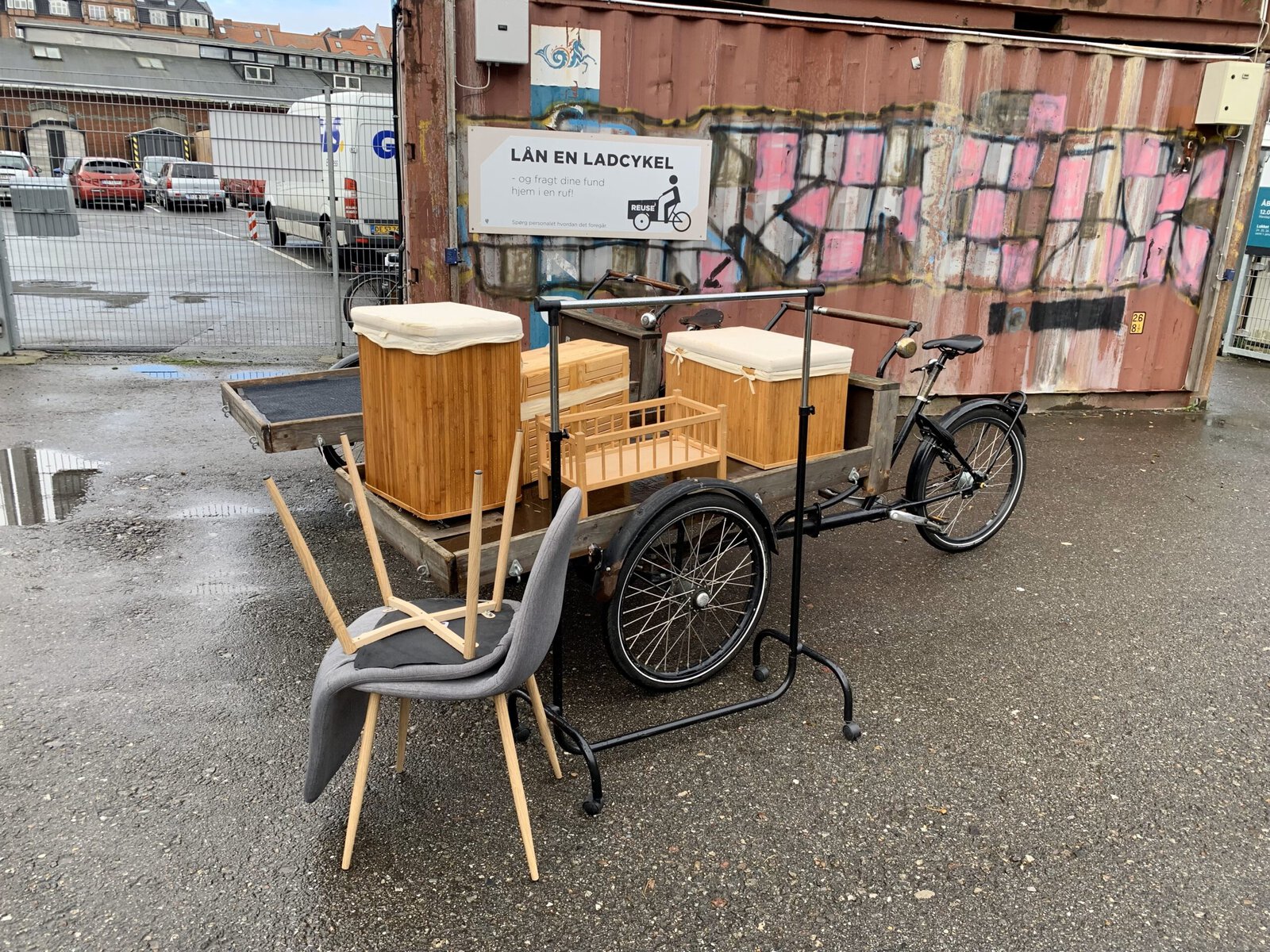 The city lends out cargo bikes that people can use to transport their goods home. Credit: Yael Berman
The city lends out cargo bikes that people can use to transport their goods home. Credit: Yael Berman
With a passion for design that led him to create a company to relaunch classic pieces from the Danish Modern movement, Andersen emphasizes the value of classic, old and possibly reused furniture. He notes that those who know what they’re looking at can find pieces from renowned, retro brands — and knowing what those items are worth makes people value them more, even if they’re used. “They just need to be seen in the right context,” he says.
Taking into account the success of the pioneer center, Aarhus is now investing in its next step: creating other centers in the city’s recycling stations so that the initiative becomes more local — and circular. Thus, the things donated by the community of a certain neighborhood will stay inside that area, explains Sofie Schousboe Laursen, who manages the project.
According to Laursen, this is why the city is actually planning to close the first center, which requires containers with goods from the surrounding recycling stations to be be transported on an approximately daily basis: “We don’t want to keep transporting, so when we open new centers in the city it becomes more circular, more local,” she says.
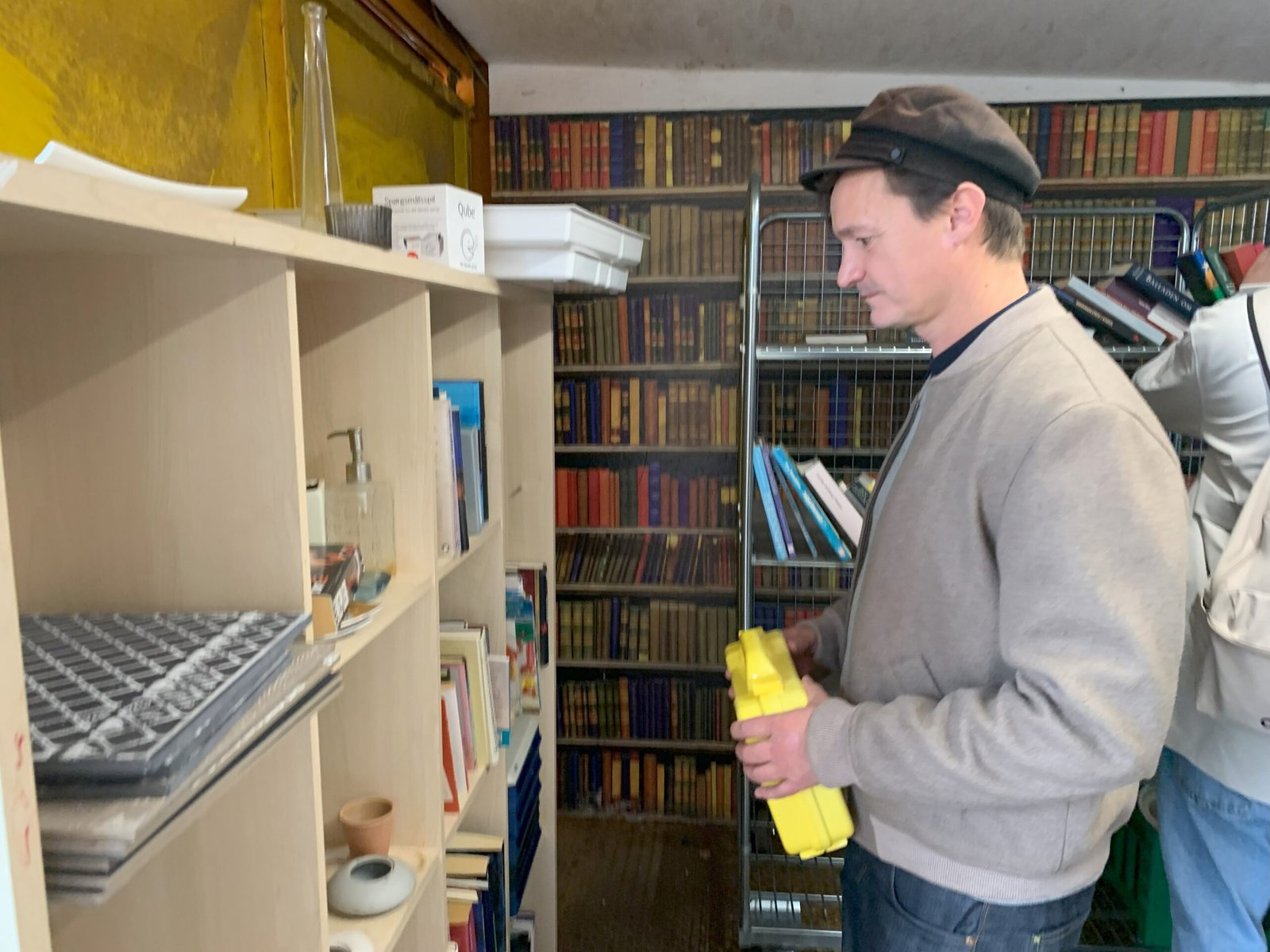 Lasse Andersen looks at donated things at one of Aarhus’ reuse centers. Credit: Yael Berman
Lasse Andersen looks at donated things at one of Aarhus’ reuse centers. Credit: Yael Berman
This is the goal of a new reuse room at the Lisbjerg recycling station, located on the outskirts of Aarhus. The area is part of one of the city’s largest urban development plans, according to the municipality, and it’s expected to grow to a population of 25,000 residents over, approximately, the next 65 years — almost 20 times the current population. That’s why it was the first recycling station to receive a reuse room. “It’s part of being prepared for the city that is being developed,” explains Laursen, adding that the recycling station itself is made with around 70 percent of recycled material.
Crushed by negative news?
Sign up for the Reasons to be Cheerful newsletter.
[contact-form-7]
The area is fairly quiet these days, but there are residents who come to drop off and take things. Among those residents are Tamer and Ulla, a couple in their 50s who go every week to look for things to reuse instead of buying them. “We don’t have a lot of money and it’s for free here. … So it’s perfect, instead of throwing it out, [there] are a lot of things that can be used again,” says Tamer.
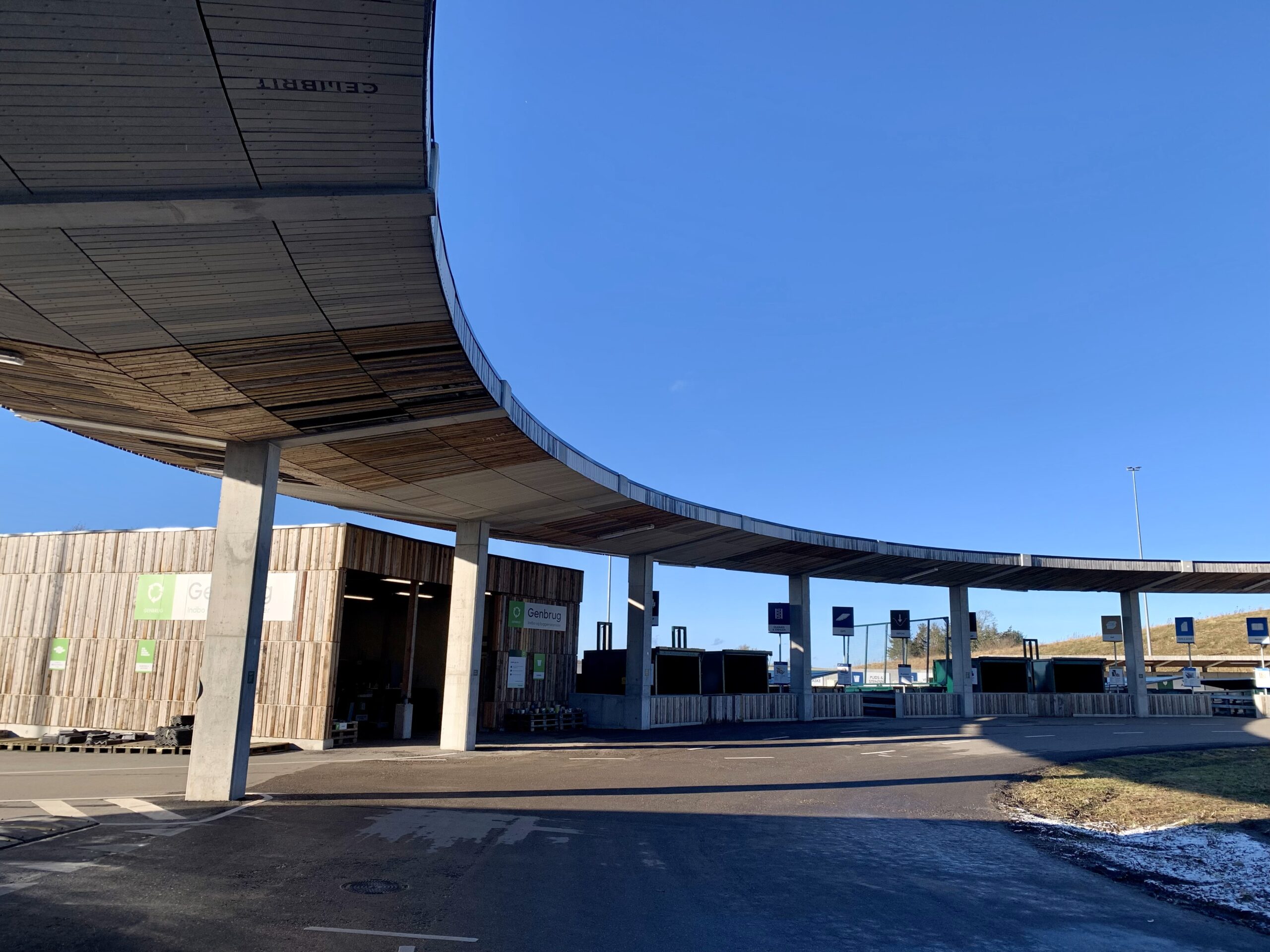 The Lisbjerg recycling station was designed to serve the influx of residents that the area is expecting in the coming decades. Credit: Yael Berman
The Lisbjerg recycling station was designed to serve the influx of residents that the area is expecting in the coming decades. Credit: Yael Berman
Ionel-Laurentiu Mavrodin, who visits the Lisbjerg recycling station about once a month, agrees. One day in early February 2024, he arrived with a friend, bringing a computer monitor and speakers. “I believe it’s good for the environment,” he says. “There’s no need to buy new stuff.”
Another center that opened after the new plan was launched was the Godsbanen center, located in the creative and cultural area with the same name. This one operates differently from the other centers, which are bigger and have staff. “It’s more cozy, self-serve. You log in with your identity number and come in,” says Laursen. “It’s a trust-based, community-based center.” It also offers a room where, with an ID, citizens can borrow things such as a sewing machine, construction tools or video games.
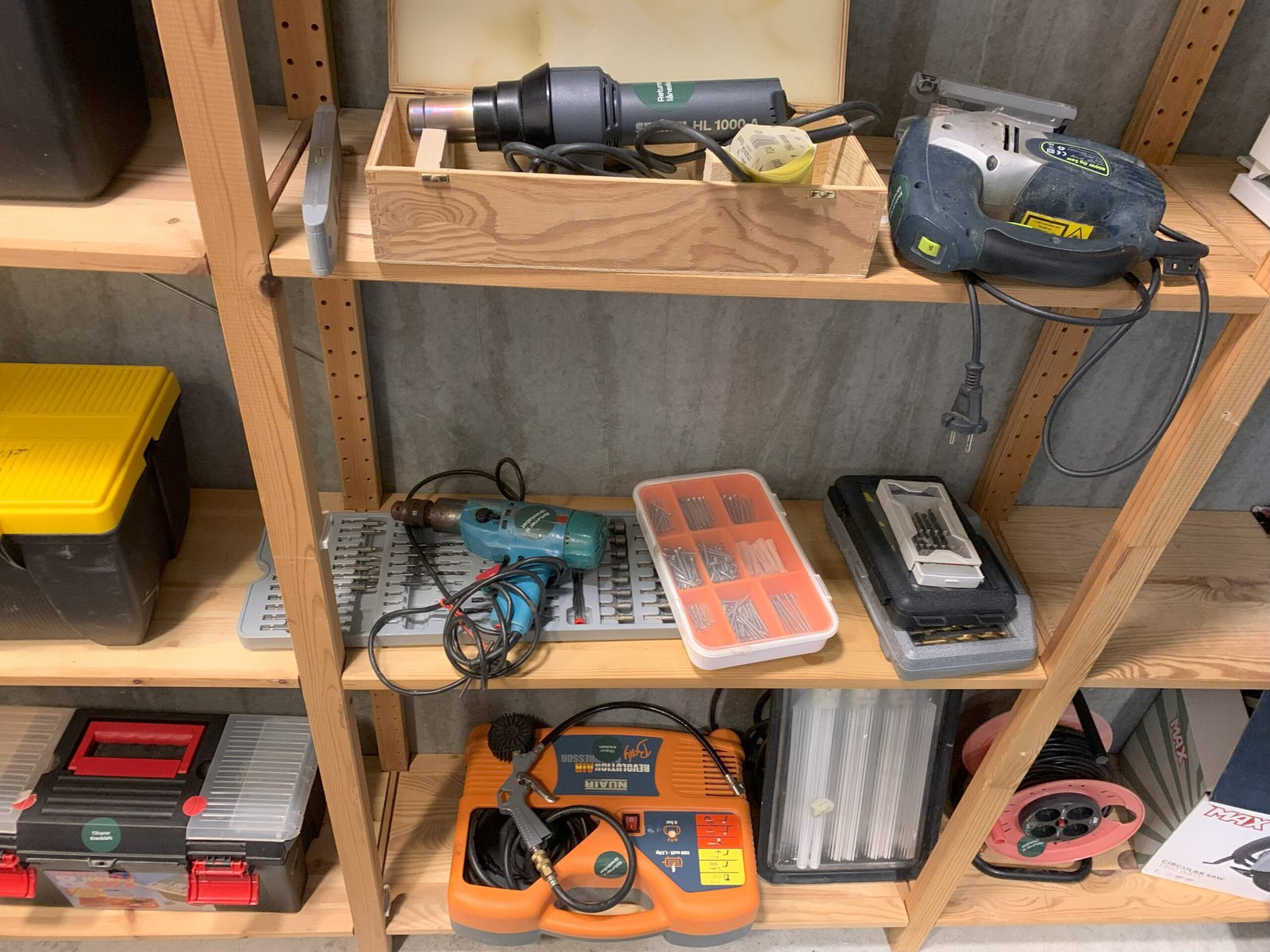 Construction tools placed at the borrowing room of the Godsbanen reuse center. Credit: Yael Berman
Construction tools placed at the borrowing room of the Godsbanen reuse center. Credit: Yael Berman
Aarhus’ plan was inspired in part by a book-saving project in Hungary, recalls Christensen, in which “Book Rescuers” circulated through the streets with special vehicles full of spare books, which they sold at very low prices. Aarhus took this concept of distributing unused things and adapted it.
Aarhus is an ideal place to experiment with such plans because its residents are keen on recycling and reusing. Besides its second-hand shop culture, the city also has a Facebook group with over 80,000 members aimed at giving things away for free.
A 2017 project, a collaboration between Aarhus University and the University of Copenhagen and led by Danish senior researcher Anders Branth Pedersen, found that most Danes were willing to spend a considerable amount of time sorting their waste.
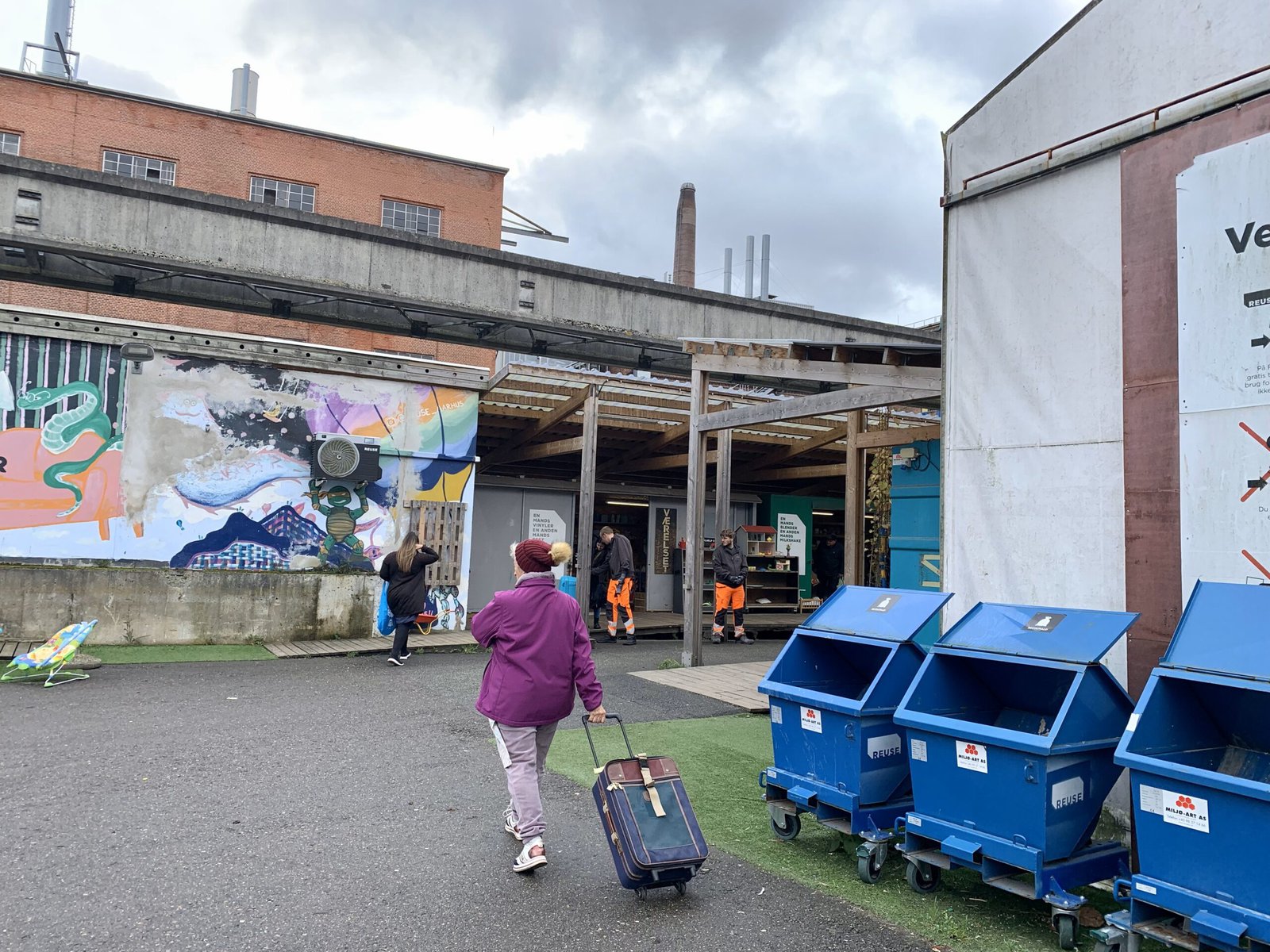 An elderly woman carries a suitcase at the circular economy center Reuse, in Aarhus, Denmark. Credit: Yael Berman
An elderly woman carries a suitcase at the circular economy center Reuse, in Aarhus, Denmark. Credit: Yael Berman
Pedersen highlights the role of residents’ trust in their government, a factor that may also influence the success of the reuse centers. The level of trust in Denmark is unusual compared to other countries, with higher trust rates for both central and local governments. When asked if they trusted that the municipality was handling the waste correctly, only 10 percent of Danes expressed low trust.
Christensen, Reuse’s coordinator, notes that people in developing countries are naturally inclined to keep things or give them another life, whereas in a wealthier country like Denmark, people sometimes give away goods that have barely been used at all. “Maybe 20, 30 percent of all the things we have here [at the center] are 100 percent unused,” he says.
Changing people’s behavior is a slow process, Christensen notes. But he is proud of what Aarhus is achieving. When it comes to building a circular economy, he notes, convincing citizens to go to recycling stations and pass on their unused objects is a crucial step.
The post The Danish City Reimagining Reuse appeared first on Reasons to be Cheerful.
Environment: Putting a price on carbon: is it worth all the trouble?
Economic theory supports a price on carbon but implemented schemes struggle to deliver emissions reductions. China firmly in the EV driving seat. Climate action is failing to meet its targets globally. Do carbon pricing mechanisms work? Almost every economist agrees (see Michael Keating and St Ross) that the most efficient, most effective, lowest cost, most Continue reading »
Video: pensioner among 3 peaceful anti-genocide protesters arrested in Hastings
State repression of civic rights and protection of weapons manufacturers continues to escalate
A pensioner and two other protestors were arrested by police on Thursday 29 February during a peaceful demonstration outside the General Dynamics arms factory in Hastings, East Sussex. The local people were among a broad coalition of community groups that came together to protest against Britain’s role in Israel’s ongoing genocide in Gaza.
The three were arrested and taken to Hastings police station where they were held for nearly fourteen hours before being charged with aggravated trespass and then released on bail. They will appear before magistrates on April 3.
Laurie Holden, 71, a retired train driver from Burwash, was one of those arrested at the demonstration. He said:
It is outrageous that the police are treating us as criminals. We are not the criminals here – we are highlighting the criminal complicity of our government and arms companies in continuing to supply arms to Israel which is in the dock for genocide in Gaza. We will always stand on the side of the people of Palestine.
The Hastings & District Palestine Solidarity Campaign [HDPSC] united with representatives of Jewish groups, trade union bodies, Quakers, climate justice groups, parent groups and political parties to draw attention to the part Hastings is playing in arming Israel.
HDPSC Chair Katy Colley said:
Our brave and principled friends have shown enormous courage in the face of disproportionate and heavy-handed policing of a peaceful, community-led protest.
In January, the International Court of Justice put Israel on trial for genocide in Gaza but since then the slaughter and starvation have worsened. Over 30,000 are dead and thousands more will die if this continues. Yesterday Israeli troops gunned down starving civilians in the north of Gaza as they waited for food – over 100 were killed and 700 injured in the ‘the Flour Massacre’. This latest horror underscores the urgency of stopping all arms sales to Israel. UN experts have warned that any arms transfers to Israel will breach international law and ordered all countries to stop all arms sales immediately.
Our government has refused to halt export licenses to Israel so it is our duty as citizens to stand up for peace, international law and human rights.
We will not stand by as the UK continues to arm this genocide of the Palestinian people. It must end now.’
The protest started at 7am at the Sidney Little Road factory, one of the two General Dynamics sites in Hastings, timed to coincide with workers as they arrived for work. Demonstrators held placards, sung songs for ‘Ceaefire Now’ and handed out leaflets which informed workers of their right to refuse to take part in handling components used in breach of international law.
Israel’s brutal campaign in Gaza has run for five months so far, killing almost 40,000 people and wounding and maiming double that number. The UN is now warning that a quarter of the population is at risk of death from famine and the World Health Organisation has said that more than a million are starving. Protests have been mounted outside arms factories all over the country, including in Kent, Leicester, Bristol, Bournemouth, Glasgow, Cambridge, Brighton, London, Lancashire, Belfast and Monmouthshire, to demand an end to UK’s ongoing complicity and enabling of genocide. This is HDPSC’s fourth protest at General Dynamics’ sites in Hastings since the campaign began.
According to the organisers, almost all of the ‘MK80’ bombs being dropped on Gaza are made by General Dynamics, which is the 5th biggest arms company in the world. The Hastings facilities provide avionic systems for fighter planes and tactical communications equipment for ground vehicles.
At the demo, Leah Levane of Jewish Voice for Labour said that Israel could no longer ‘act with impunity’.
It is shocking that the UK government is granting arms licences to Israel,’ she said. ‘This makes the UK partners in the occupation and the genocide in Gaza. As a Jewish organisation, we are one of several Jewish groups in the UK and the many more across the world who are protesting loud and clear – NOT IN OUR NAME.
Jen Rouse, representing Parents for Future Hastings & St Leonards, said:
We’re here today because as parents we cannot stand by and watch as our government supports a genocide of children.
The thought of our own kids having to live through even a fraction of the terror and trauma that Israel inflicts on Gazan children every day is unbearable. So the only right thing for all UK parents to do is to be here today, demanding an immediate end to the bloodshed. We will never give up until we see a free Palestine.
Simon Hester, Chair of Hastings & District Trades Union Council, added:
Hastings & District Trades Union Council supports the calls for end to all arms sales to Israel and for an immediate ceasefire to end the genocide in Gaza.
We demand that General Dynamics UK stop supplying equipment to the Israeli army or to get out of Hastings. We stand in solidarity with the people of Palestine.
Olivia Cavanagh of Hastings Community of Sanctuary and Hastings Supports Refugees said:
We continue to call for an immediate and permanent ceasefire in Gaza and the West Bank.
We support an embargo on arms sales from the UK to Israel and stand with the Hastings community to call on the local General Dynamics factories to stop supplying arms to Israel and to act to end the unprecedented killing of Palestinian civilians.’
Yunis Smith from Hastings Green Party said:
Years from now the children of the world will ask what did you do to stop this calamity? I for one hope I will have a good enough answer!
And Chris Goodchild of Hastings Quakers said:
The poor tell us who we are, the prophets who we can be. Yet we kill the poor and kill the prophets. We are all Palestinian and civil disobedience is divine obedience. Stop arming Genocide.
The arrest form part of an escalating campaign of repression and demonisation of peaceful protesters demonstrating against genocide. PM Rishi Sunak, who like ‘opposition’ leader Keir Starmer has constantly backed Israel’s murderous actions, has today smeared demonstrators as divisive and hateful and has threatened to deport those who fall foul of what he considers the limits of acceptable protest.
SKWAWKBOX needs your help. The site is provided free of charge but depends on the support of its readers to be viable. If you’d like to help it keep revealing the news as it is and not what the Establishment wants you to hear – and can afford to without hardship – please click here to arrange a one-off or modest monthly donation via PayPal or here to set up a monthly donation via GoCardless (SKWAWKBOX will contact you to confirm the GoCardless amount). Thanks for your solidarity so SKWAWKBOX can keep doing its job.
If you wish to republish this post for non-commercial use, you are welcome to do so – see here for more.
Our life support systems of climate, water and ecological services are in collective crisis
“A nation that destroys its soils destroys itself. Forests are the lungs of our land, purifying the air and giving fresh strength to our people.” —Franklin D. Roosevelt. We must educate and act urgently on these problems. The continuing decline of the life support system of ecosystem services and biodiversity is a crisis needing urgent, Continue reading »
In the Long Run: The Future as a Political Idea – review
Jonathan White‘s In the Long Run: The Future as a Political Idea examines how changing political conceptions of the future have impacted democracy, arguing that contemporary challenges like economic slowdown and climate change have led to reactive politics and short-termism. Though the book proposes ways to revitalise democracy, Aveek Bhattacharya suggests we may need to seek beyond our political institutions for strategies to build a more open future.
You can read an interview with Jonathan White about the book here. On Monday 11 March at 6.30pm White will speak at an LSE panel event, The politics of the future – find details and register here.
In the Long Run: The Future as a Political Idea. Jonathan White. Profile Books. 2024.
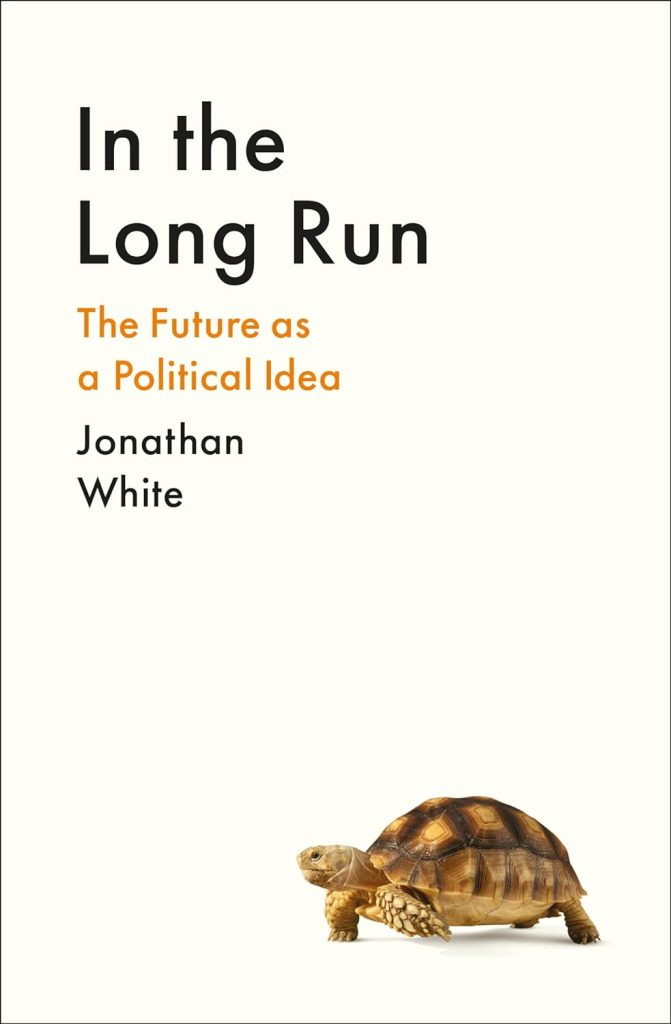 In the Long Run: The Future as a Political Idea is a book about the history of the future, and what it means for the present. More precisely, it describes how the way people think about the future has evolved over time, and the impact of these changes on democracy. Jonathan White’s central argument is that while optimism for the future once helped build democracy, economic slowdown, climate change, new technology and geopolitical tension mean that “the future no longer seems its [democracy’s] friend”.
In the Long Run: The Future as a Political Idea is a book about the history of the future, and what it means for the present. More precisely, it describes how the way people think about the future has evolved over time, and the impact of these changes on democracy. Jonathan White’s central argument is that while optimism for the future once helped build democracy, economic slowdown, climate change, new technology and geopolitical tension mean that “the future no longer seems its [democracy’s] friend”.
For democracy to function, White observes, it is critical that people believe an “open future” is possible: that there are alternatives to the status quo, that society can evolve in a range of different ways, and that the people can choose between them. One of the key defining characteristics of democracy – the peaceful handover of power – is premised on changeability of the future: election losers believe that they will get their chance to achieve their vision of society again.
For democracy to function, White observes, it is critical that people believe an ‘open future’ is possible
In the present, White says, it is harder to maintain that patience and faith. The future is regarded with fear and claustrophobia. At various points he describes the future, far from being open, as “closing in”. Catastrophe – societal decay, conflict, environmental collapse – feels hard to avert. Insofar as there are options, they involve deferring to technocrats. There is a “now or never” urgency about politics, and a fear that waiting your turn means leaving it too late because the other side will destroy everything.
Via a tour of historical political thinkers, White sketches the ideas of the future that make for the most vibrant democratic system. Political and social outcomes must seem open, but not in such a destabilising manner as to trigger counter-revolution from those attached to the present. A strand of utopianism can be energising but must be linked to near-term political tactics to be practicable. Efforts to limit uncertainty, to render the future predictable, through calculation and technocracy risk squeezing out the necessary imagination and mass participation of vibrant democracy. At the same time, chaotic impulsiveness and pure disregard for expertise risks descending into fascism. Trying to control the future by keeping it secret is likely to generate conspiracy theories and discontent. Consumerism individualises the future and means we no longer share in it – we move from valorising Victorian steam trains to wanting our own personal cars.
Our perpetual state of emergency, while creating unpredictability, produces reactive politics, designed mainly to return things to the way they were.
The conception of the future we have arrived at today is not, in White’s opinion, sufficiently conducive to democracy. Our perpetual state of emergency, while creating unpredictability, produces reactive politics, designed mainly to return things to the way they were. Short-termism dominates – most notably, through the election cycle, but even longer-term threats like climate change are tractable only by converting them to benchmarks and deadlines. Managerialism and secrecy dominate, empowering organisations like the European Central Bank and the International Monetary Fund and triggering impulsive populist backlashes.
White’s proposals for rebuilding a more positive conception of the future and revitalising democracy are somewhat surprising. He is sceptical of direct democracy – while more referendums might give ordinary citizens more chance to shape the future, they raise the stakes and perpetuate the “all-or-nothing” politics he thinks is so baleful. Small-scale councils are too small-scale to create significant change, citizens’ assemblies too short-lived to pursue a persistent vision.
White calls for ‘radical representative democracy’, with mass participation in the development of party policy and party members having greater opportunity to recall politicians who fail to deliver on those agreed goals.
Instead, he puts his chips on political parties as the crucibles of a more inclusive, compelling and hopeful vision of the future. He calls for “radical representative democracy”, with mass participation in the development of party policy and party members having greater opportunity to recall politicians who fail to deliver on those agreed goals. It’s an argument with echoes of Peter Mair’s Ruling the Void, which also claimed that the disengagement of ordinary members and politicians from their political parties had led to “the hollowing of Western democracy”.
White’s rebooted party system sounds good in theory, but invites scepticism about its practicality. His central assumption is that citizens’ disempowerment is the root cause of our current democratic malaise, and that the opportunity for greater influence will suffice to tempt enough people to give up their evenings and weekends to political causes. It is not encouraging that the existing parties that have done most to engage with mass movements and improve participation with things like online platforms – Podemos in Spain and the Five Star Movement in Italy – do not seem to have restored democratic confidence in their countries.
The Victorian capitalists who built the factories and railroads may not have been personally attractive, but they inspired progressives and socialists to dream about how their innovations could be used to benefit all.
White is oddly dismissive of the pockets of optimism that do exist outside the political system – most notably Silicon Valley, where ideas like “Effective accelerationism”, the view that technological progress is likely to obviate many of our deepest societal challenges, has taken root. For White, they display the wrong sort of optimism: too consumerist and individualistic, too inclined towards anti-system chaotic thinking, tendencies encapsulated in the figure of Elon Musk, presented as fascistoid, if not fascist. Setting aside whether that is a fair characterisation of Musk, the question it raises is why the confidence of tech companies seems so divorced from the sentiments of wider society. The Victorian capitalists who built the factories and railroads may not have been personally attractive, but they inspired progressives and socialists to dream about how their innovations could be used to benefit all. There are some – figures like Aaron Bastani on the far left and Derek Thompson on the centre left – that are trying to do something similar today, but White does not recognise them as such.
White assumes that the problems of democracy are endogenous: that they are caused by political institutions and must be resolved by them.
Most fundamentally, White assumes that the problems of democracy are endogenous: that they are caused by political institutions and must be resolved by them. But there are more straightforward explanations for the modern morosity. Stagnant economic growth, and the failure of new technologies to demonstrably improve living standards, would naturally be expected to undermine confidence that things will improve. The demographic shift to an older population in rich countries may also have contributed to a lack of vitality and enthusiasm, and a tendency to look back with nostalgia rather than forward with hope. Even among the young, we should not necessarily take perceptions at face value. Phenomena like “climate anxiety” seem to reflect anxiety at least as much as they reflect the climate, and as such will often be psychological, not just political in nature.
That’s not necessarily a comforting thought. Maybe technological abundance is around the corner, maybe the economy will turn around, maybe the mental health crisis will abate – whether by sheer luck or unusually effective action – and people will start to feel better about the future. But In the Long Run suggests that fixing democracy’s problems, renewing our faith in the open future, is a much bigger task than tweaking its institutions.
This post gives the views of the author, and not the position of the LSE Review of Books blog, or of the London School of Economics and Political Science.
Image credit: Ryan Rodrick Beiler on Shutterstock
Heatwaves and blackouts: Australia’s climate crisis is now
As Western Australia endures another extreme heatwave, with temperatures soaring up to 47 degrees Celsius in the Pilbara, the reality of the impacts of climate change is becoming impossible for Australia to ignore. Escalating and unprecedented heat is harming our communities, ecosystems, and economy. Last week Victoria was battered by fires and storms that destroyed Continue reading »
Environment: The wealthy cause climate change; the poor suffer its consequences
Richest 1% produce as many greenhouse gases as the poorest 66%. Climate denialists have a new lyric: ‘sure, it’s happening – so what?’ but Australians are concerned about climate change and want action. No, it’s not OK to shoot a hippo. Climate Equality: A planet for the 99% … is the title of a report Continue reading »
How Farmers Are Preparing for a Saltier Future
When Arjan Berkhuysen and his fellow volunteers on the Dutch island of Terschelling looked for a spot to start a garden, they sought the least fertile location they could find. The plot they landed on is just over a dike from the Wadden Sea along the Netherlands’ northern coast. The water in the irrigation ditches is often brackish. For most growers, salinity is an affliction; salt in soil or water can diminish plant health and reduce crop yield. But for this group of gardeners, the spot was ideal.
De Zilte Smaak — “The Salty Taste” — specializes in edible plants that grow in saline conditions, like samphire, tiny spears that resemble asparagus, and tender-leafed sea aster. The salt-loving delicacies grown on this plot end up on plates in restaurants across this island, a popular summer destination. The project is one of a number of initiatives in the Netherlands exploring the possibilities of farming in salty conditions, ranging from edible plants in small-scale gardens like this, to identification of salt-tolerant varietals of conventional crops like potatoes and beets.
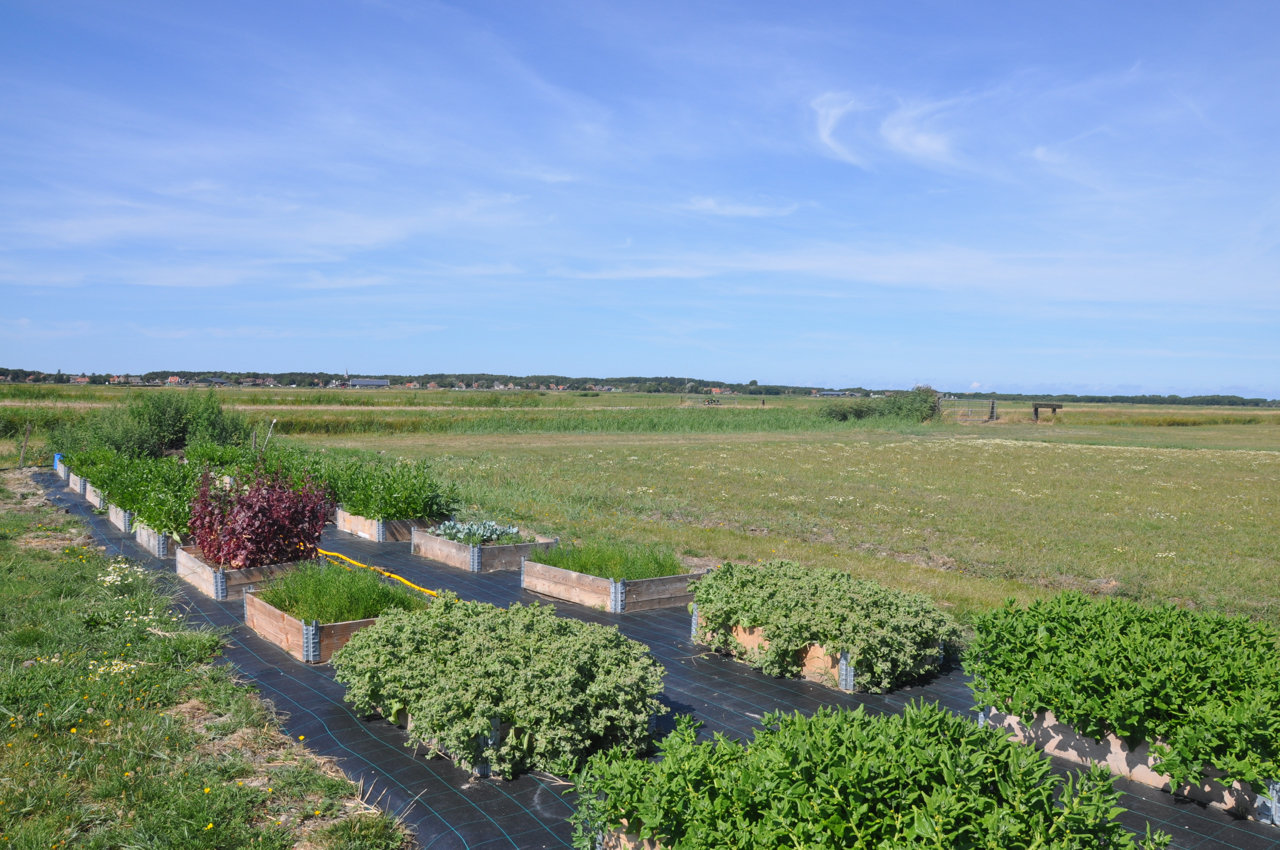 Most of the vegetables De Zilte Smaak grows are distributed to local restaurants. Courtesy of Stichting De Zilte Smaak
Most of the vegetables De Zilte Smaak grows are distributed to local restaurants. Courtesy of Stichting De Zilte Smaak
In the Netherlands and worldwide, more and more farmers are facing challenges with food production as climate change makes soils and water saltier. Globally, an estimated 20 percent of cultivated land is affected by salinity. In the Netherlands, where a quarter of land is below sea level, some regions are seeing impacts already, and salinity is expected to become a more prominent hurdle for agriculture in the decades ahead. But recent developments are proving it’s possible to adapt farming techniques and crops to saline conditions.
“As humans, we tend to always adapt the environment to us,” says Berkhuysen, a member of De Zilte Smaak’s board. “Here, [we] try to adapt ourselves to the environment.”
For cooking, salt can make food tastier. But for farming, it’s generally bad news. When salt becomes concentrated in soil or water, it can damage plants, reduce the yield of crops, and even make farmland useless.
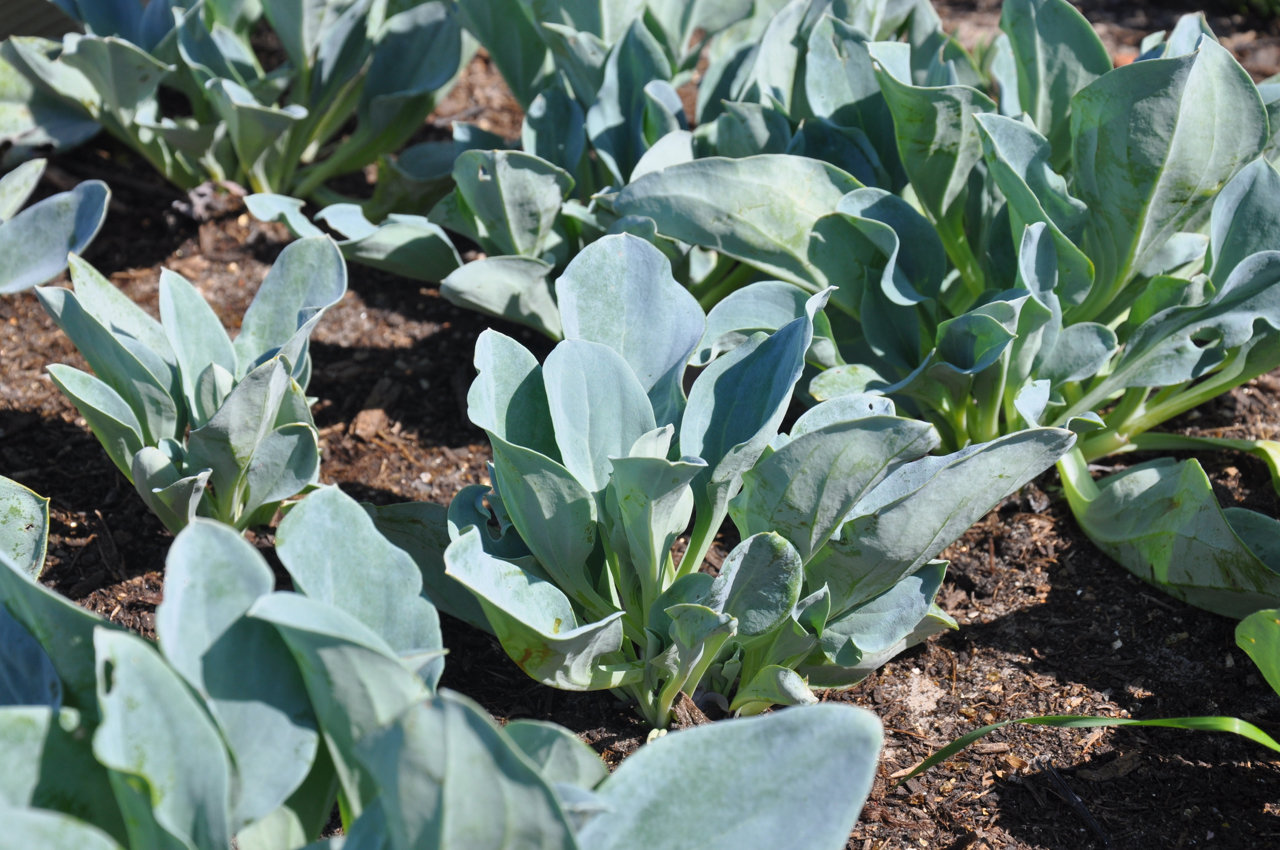 Oesterblad, or oyster leaf, is among the salt-tolerant plants De Zilte Smaak grows. Courtesy of Stichting De Zilte Smaak
Oesterblad, or oyster leaf, is among the salt-tolerant plants De Zilte Smaak grows. Courtesy of Stichting De Zilte Smaak
“It can be a big problem because for a lot of cash crops salinity is not good,” says Kate Negacz, an assistant professor with Vrije Universiteit Amsterdam’s Institute for Environmental Studies. She heads the Saline Agriculture for Adaptation (SALAD) project, which is researching saline agriculture in Europe and North Africa. “They will perform worse, which can then lead to food security challenges.”
Salinization is not a new problem. Evidence suggests salinity hindered ancient societies from Mesopotamia to Peru. But phenomena associated with climate change and other human activities are driving salinity in a number of ways. Warmer temperatures, for instance, lead to higher rates of evapotranspiration; as water leaves the soil through evaporation and is taken up by plants, salt is left behind. During periods of drought, when there’s little rain, salty seawater can seep inland via groundwater and the mouths of rivers. Even in areas far from the coast, salt can concentrate as groundwater depletes. Rising sea levels are also leading to more flooding involving saline water, leaving impacts on the land.
In a rice-growing region in Vietnam, where salinity once reached 30 to 50 kilometers from the coast, it now is seeping in more than 100 kilometers. Inland areas are affected too: in Australia, severe salinity impacts more than one million hectares of formerly productive farmland. Mid-Atlantic farmers in the United States are struggling with salt patches. Coastal erosion and sea-level rise in Egypt are deteriorating the quality of cultivated land.
The post How Farmers Are Preparing for a Saltier Future appeared first on Reasons to be Cheerful.
Bring on our Green Industrial Revolution – But watch for white elephants
Bravo to Ross Garnaut and Rod Sims for their effort at the National Press Club on 14 February to overturn the whole national debate on climate, energy, productivity and tax. But the Green Industrial Revolution may not fall easily into Australia’s lap. Garnaut and Sims are right that our coal and gas exports will dwindle Continue reading »















